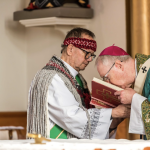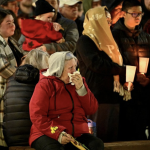VANCOUVER (CCN) — Catholic School teachers attending the annual Catholic Educators Conference were called to pursue truth first in their work towards reconciliation with Indigenous people as a potentially painful and necessary part of the healing process.
“My dream is that our speakers at this year’s conference will further help to inform and transform our thinking, as we continue to seek the truth that will lead to healing,” said CISVA superintendent Sandy Marshall at the opening of this year’s Catholic Educators Conference.
The theme of the 43rd conference, “seeking truth, peace, and reconciliation,” was the focus for the first day of speakers, and the opening keynote was given by former B.C. Lieutenant Governor Steven Point (Xwĕ lī qwĕl tĕl), a Catholic and member of the Skowkale First Nation.
“If truth and reconciliation is going to have any traction, any meaning, it has to begin with the task of finding out what has happened – what is the history,” he told the teachers.

“Truth and reconciliation begins with telling our story,” he said. “I don’t think it’s enough to simply bring a basket into your classroom, or bring in a carver, or rename a hall – although those are nice – but they don’t bring home to you the true impact that colonialism and the arrival of Europeans has had on our people.”
“My dear people, we are all in this cage,” he said. “We want to be free from our own misconception about our past. If we want to truly learn the truth, we must die a little bit inside and humble ourselves to one another.”
Point gave an abridged history of British Columbia focusing on the relationship between colonials and Indigenous people.

From early trade relationships, through the gold rush and early settlement, Point highlighted the relationship between aboriginal peoples and the land, but also their relationship to a larger world that often saw them as little more than an obstacle to the progress of the empire.
“All of these political developments – the establishment of Victoria, the establishment of New Westminster – were happening outside the awareness of Indigenous people and Indigenous leaders,” said Point. “What we [Indigenous people] knew is that people were arriving – sometimes building farms, and sometimes putting fences around them.”
“The Stó:lō people had 55, 000 square miles of land,” said Point. “Today I live on an Indian reserve with 135 acres set aside by the government, from our own land, for our use and benefit, owned by the federal government.”
During a talk on the history of the Church’s relationship with Indigenous people in B.C., James Borkowski rounded out Point’s history with a description of the first and second waves of missionary work in the province.
Those periods were predominantly constructive times for the Church’s relationship to Indigenous people, said Archbishop Miller’s Delegate for Operations.
He ended with a discussion of the Church’s involvement with the residential school system, drawing on his recent webinar “Into the Deep.”

“I want you to remember that we were responsible for the safety of these children,” Borkowski said, speaking to those who may want to downplay the Church’s involvement in the residential school system.
He went on to list the abuse, neglect, and forced cultural disconnection experienced by the children in residential schools, all of which have resulted in multigenerational brokenness that he says, “would bring any culture to its knees.”
Praising their resilience, Borkowski said the Indigenous people he has worked with have been “forgiving and willing to allow us to listen and to learn and accompany.”
He suggested the Church and educators are being called to form a missionary “a third wave,” to learn from history, align ourselves with Indigenous peoples, and “fight for the rights that the Church has acknowledged since at least the 1530s.”
Borkowski told the teachers, “We are being called to live the corporal works of mercy,” even if it “means the risk of being underfunded, overworked, criticized by governments, the media, and the world.”

CISVA interim Indigenous education consultant Alexis Grace gave the teachers some practical wisdom and encouraged them to witness.
“Culturally that means you all have a responsibility. To be called on as a witness means that you need to share what you have learned today. You need to share your teachings, and you can not be stingy with them,” she said.
“[History] is how we keep things alive. Listening learning and healing together.”



